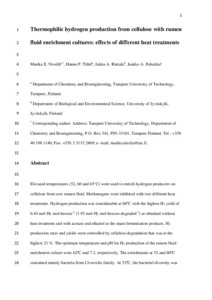Thermophilic hydrogen production from cellulose with rumen fluid enrichment cultures: Effects of different heat treatments
Nissilä, Marika E.; Tähti, Hanne P.; Rintala, Jukka A.; Puhakka, Jaakko A. (2011)
Nissilä, Marika E.
Tähti, Hanne P.
Rintala, Jukka A.
Puhakka, Jaakko A.
2011
Julkaisun pysyvä osoite on
https://urn.fi/URN:NBN:fi:tuni-202107096260
https://urn.fi/URN:NBN:fi:tuni-202107096260
Kuvaus
Peer reviewed
Tiivistelmä
Elevated temperatures (52, 60 and 65 °C) were used to enrich hydrogen producers on cellulose from cow rumen fluid. Methanogens were inhibited with two different heat treatments. Hydrogen production was considerable at 60 °C with the highest H2 yield of 0.44 mol-H2 mol-hexose -1 (1.93 mol-H2 mol-hexose-degraded-1) as obtained without heat treatment and with acetate and ethanol as the main fermentation products. H2 production rates and yields were controlled by cellulose degradation that was at the highest 21%. The optimum temperature and pH for H2 production of the rumen fluid enrichment culture were 62 °C and 7.3, respectively. The enrichments at 52 and 60 °C contained mainly bacteria from Clostridia family. At 52 °C, the bacterial diversity was larger and was not affected by heat treatments. Bacterial diversity at 60 °C remained similar between heat treatments, but decreased during enrichment. At 60 °C, the dominant microorganism was Clostridium stercorarium subsp. leptospartum.
Kokoelmat
- TUNICRIS-julkaisut [16977]
